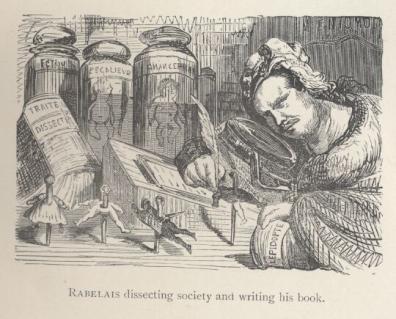Lyndon Hood - extractor of the quintessence
Sunday, November 02, 2008

I've mentioned elsewhere that I've been reading Rabelais' Garganua and Pantagreul (Project Gutenburg has a version with Doré illustrations - as above). I've got to the third book and I worry that, having been outed from under his pseudonym, M. Rabelais has gotten duller and preachier; either way I'm not currently in the mood so rather than read it, I'll write about it.
Rabelais seems to have been in it for his own entertainment and, bodily functions aside (though bodily functions do feature hugely), the thing that apparently entertains him is the words. No doubt his delight in puns translate poorly, but it's still obvious; he also has a habit of embarking on enormous lists of things - lists that you'd think would be too long even for an American to love, but take on a kind of grandeur in their endlessness.
A combined example: One character, having been brough back from the dead (he had his head sewn back on) describes the degraded occupations of various classical celebrities in the afterlife, playing on the words of the standard tag that accompany their names. This book has
You'll get some idea of the mind we're dealing with if I say that list goes on for most of three pages.
You will also deduce the plot runs to the big and silly (Garganua and Pantagreul are both giants, as you might imagine). Various satirical points come up, often quite explicit, but the whole thing is so blatant they somehow sneak up on you.
Keen readers will know I've been looking - profitably and usually enjoyably - at various Great Works of Satire. I didn't expect to be influenced by Rabelais the way I was by Swift, Cervantes, Twain or Bierce (and others) but in a small way it happened.
For one thing, that last column includes a rather uncharacteristic, but slighly rabelaisian reference to vomit. And it wasn't the first thing I though of either. I'm sure M. Rabelais would be rather bemused by my self-censorship.
But I think the mad monk's playfulness influenced a bit that went down well with my test audience - the passage in the coalition conditions about "... with a determination equal to the number of days since an international sporting victory multiplied by the baubles of office while keeping government honest." I'm thinking in particular of Gargantua's masterful resolving of an legal case which everyone else has found incomprehensible. Because it is: the exposition and solution are presented as a large quantity of finely-crafted nonsense.
Both fun things to write, anyway.
So. On the shoulders of giants, more literally than usual.
Labels: Francois Rabelais, Gargantua and Pantagruel, satire, satirists

